Kits off for queer liberation
Ryan Cahill speaks to queer activists baring all in a 2025 throwback to Gay Times’ cult classic ‘Naked Issue’
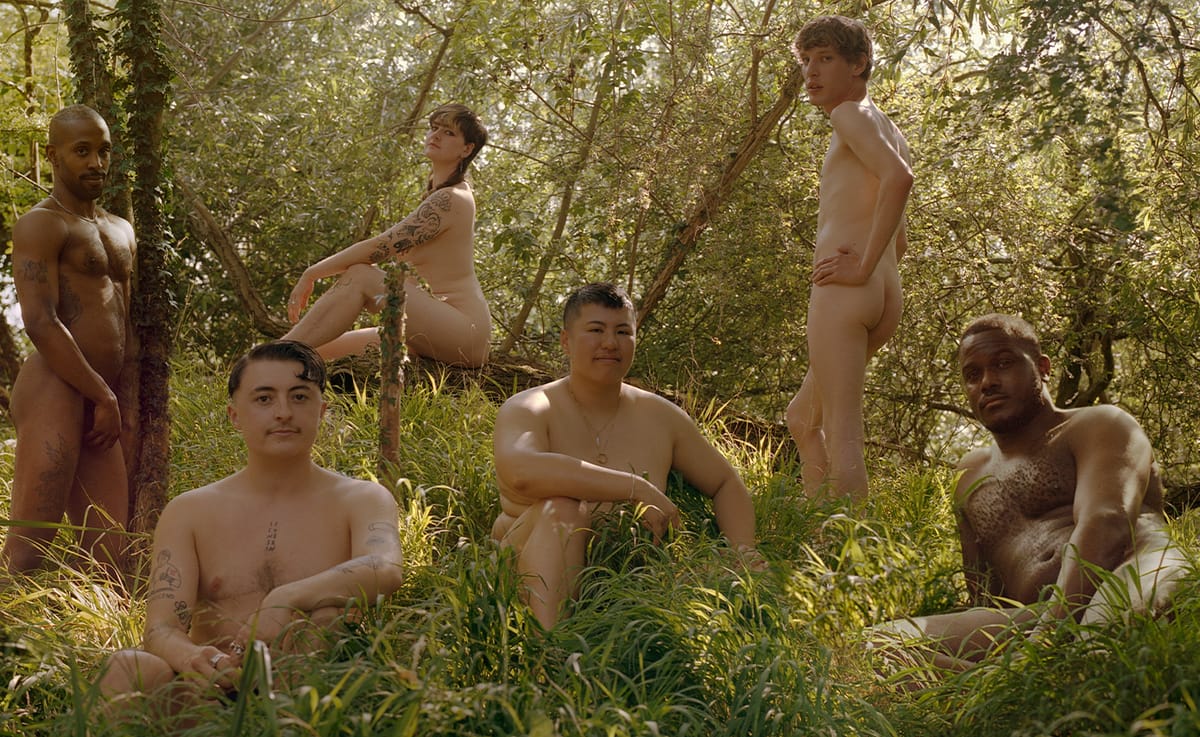
Photography: Richard Dowker, Interviews and Casting: Ryan Cahill, Production: Ellie Smith at Companion, Intro: Megan Wallace
Eternal thanks and gratitude to our models: Dan Glass, Doug Foot, VIV, Mazharul Islam (Act Up/ This Is My Culture), Ryan Zaman (Alloy), Jeng Au, Milo Turnley (Trans Pride), Phil Samba, Courtney Francis (Queer Health / The Love Tank)
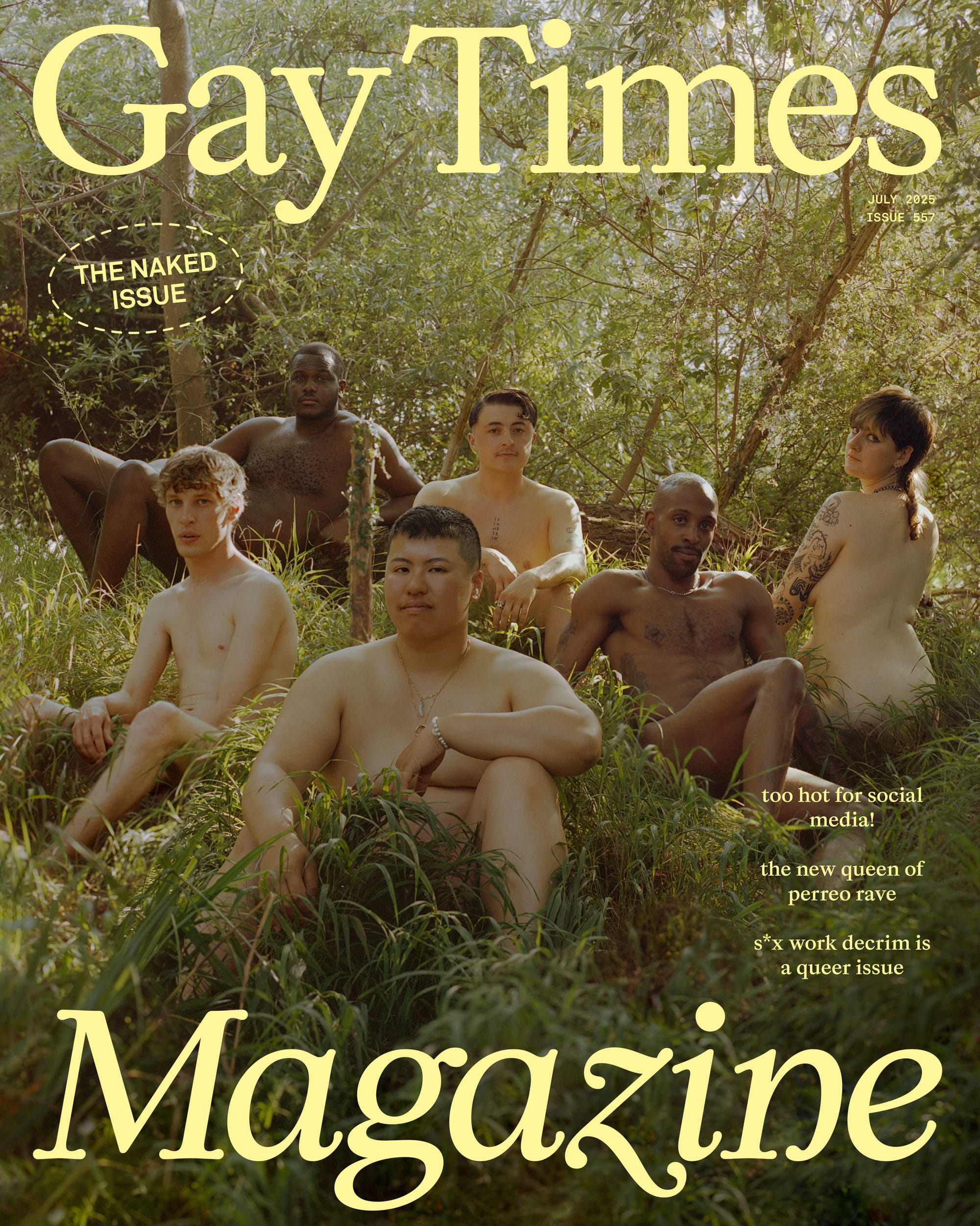
In May of this year, pearl-clutching dog walkers launched a campaign to "reclaim" Hampstead Heath from cruisers, plastering the park with signs encouraging the straight population to "take back West Heath" and asking queers to "get a room". If you read the tabloids, you'll have seen it snowball into a mini moral panic, replete with hand-wringing op-eds about the social ills of cruising. However, cruising culture in the North London park was not going down without a fight, and why would it? The West Heath has long been a gay cruising spot, famously frequented by George Michael (when confronted by a News of the World photographer on the Heath, he countered: “Are you gay? No? Then fuck off! This is my culture!”). The queer community was quick to respond to the threat to cruising on the Heath, in camp, provocative and fearless fashion. Organised by Act Up/This Is My Culture, the "sodomites march" saw queer activists take to the Heath for a day of baring bums and witty signs, defying prudish attitudes and taking aim at the ongoing homophobia in the media.
Why do we bring this up? Well, it was an action that reminded us of the ways that sex positivity and queer justice can go hand-in-hand – both movements which rally against the restrictive norms of the patriarchy, push for sex worker rights, and centre pleasure. It also underscored the importance of pushing against respectability politics in order to preserve the rituals which make queer culture unique. So, in homage to the "sodomites march", Gay Times has invited a group of some of London's most committed queer activists and advocates – working across fields such as disability representation, sexual health, safer spaces in nightlife, and human rights – to bravely bare all while discussing their work and the causes that motivate them.
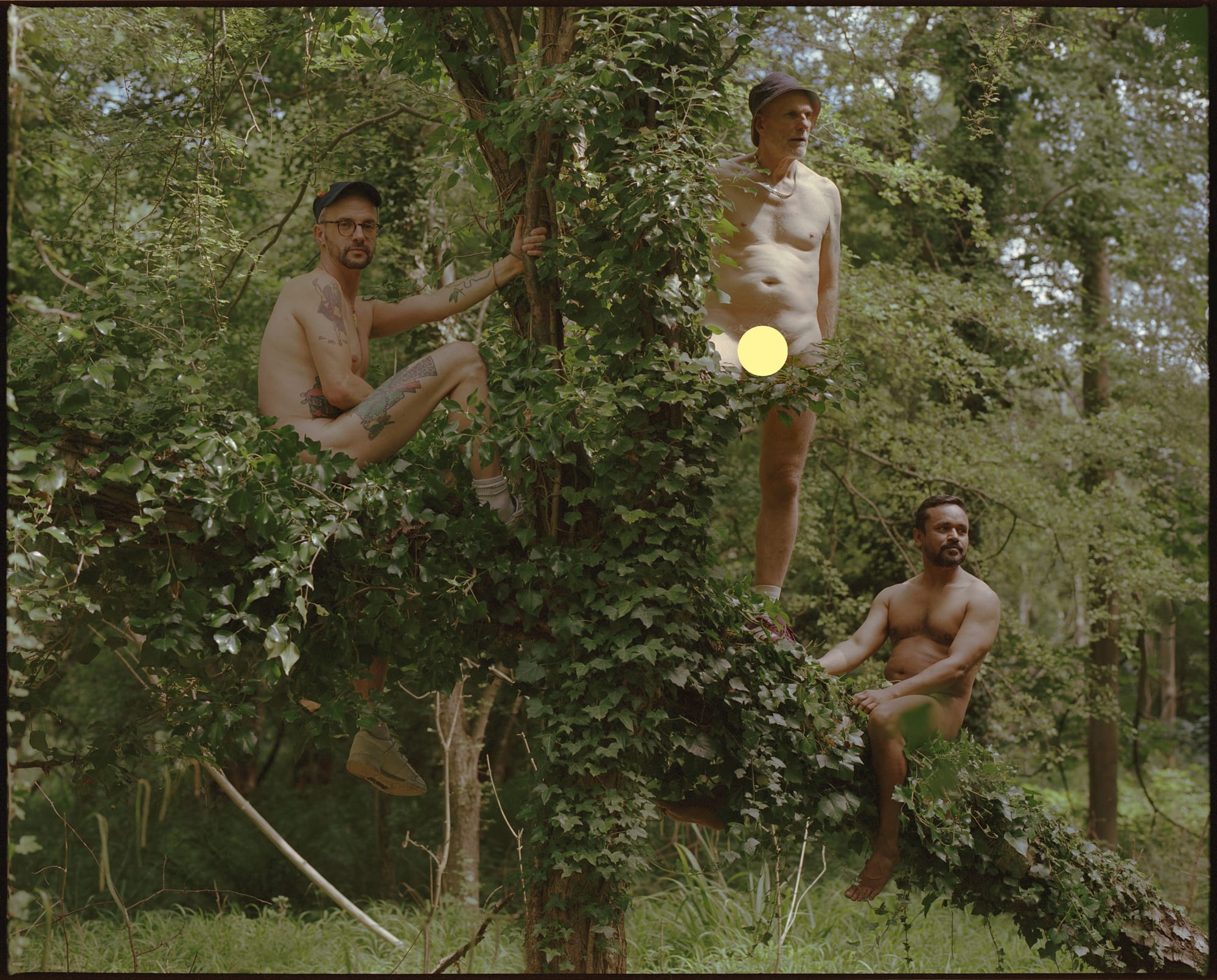
DAN GLASS
"I am constantly reminded of the gravity of being alive when so many aren't"
Dan Glass is an activist, writer, and performer deeply embedded in the fight for health justice and queer liberation. He is a leading voice in the AIDS Coalition to Unleash Power (ACT UP) London, a direct action group reformed in 2014 to challenge the ongoing HIV/AIDS pandemic and the broader injustices that sustain it. ACT UP London has spearheaded intersectional, high-impact campaigns from fighting for free access to PrEP to building coalitions like Docs Not Cops to defend the NHS.
ACT UP is committed to ending the HIV pandemic through a comprehensive approach that includes not just treatment access, but mental health support, housing, and economic justice. The group combats stigma and champions the visibility and leadership of people living with HIV and AIDS. Dan is instrumental in creating intergenerational activist spaces where veteran campaigners share tools for change with new voices ready to shape the future.
Whether through protest, public speaking, or performance, Dan’s work is rooted in the belief that HIV/AIDS is not just a medical issue, but a political one. His activism is brave, bold, unapologetic, and fiercely committed to building a world where healthcare is a fundamental right, not a privilege.
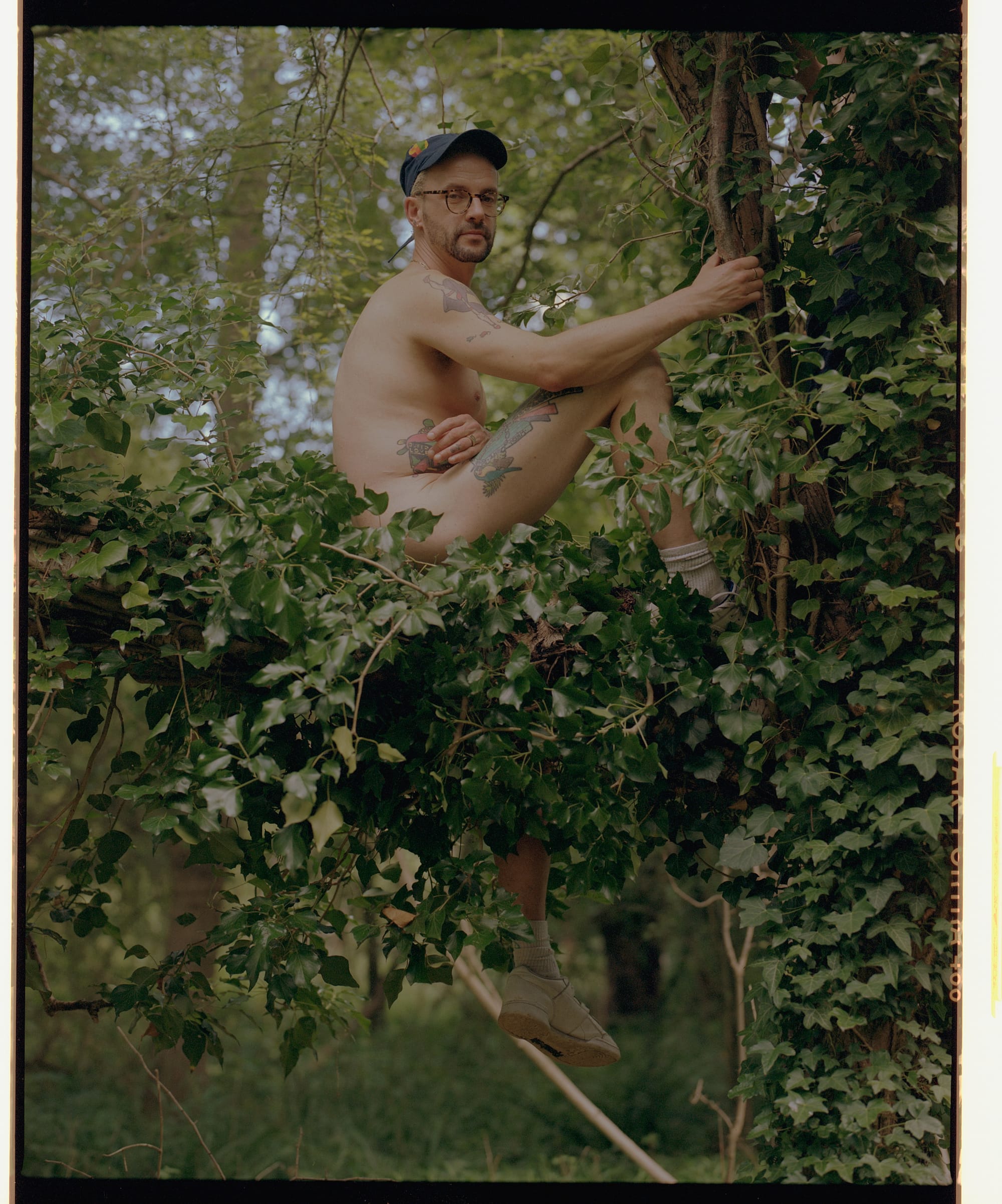
Any big projects with regards to activism or advocacy that you’re working on at the moment or have been involved in recently?
We are creative, fierce and fabulous. Now much of ACT UP’s energies are focused on building queer revolutionary power and strategic escalation against the prioritisation of war and profit over healthcare for all. Our ‘Fund Healthcare Not Warfare’ campaign is a flourishing coalition of healthcare workers, anti+war and peace activists, Palestinians and Jewish Voice for Peace organisers catalysed by ‘AIDS Coalition to Unleash Power’ (ACT UP). We recognise that genocide is a public health issue, that Palestine is under medical apartheid, that the escalating crisis in Palestine demands dynamic solidarity and that we have a duty to act now.
What drives you forward with regards to activism and advocacy?
If there's one thing I've learnt since being diagnosed HIV+ 20 years ago, starting medication 15 years ago, reforming ACT UP London 12 years ago and sitting in a sun-soaked woodlands 9 years ago that began the annual highlight ‘Fuck Off This Is My Culture’ party born out of grief for George Michael and all queer and HIV+ ancestors ... It is that time ticks differently when you are part of the struggle for justice and that behind each face there is a person. Behind every person there is a story. Behind every story there is tragedy, behind tragedy there are emotions and behind emotions there is love. That's the web the movement weaves that warms our backs to continue.
I am constantly reminded of the gravity of being alive when so many aren't (42.3 million people have died from AIDS-related illnesses to be precise) and the importance of activism today when we face the biggest global cuts to HIV+AID services in history. ACT UP involves organising with legends who from across the world and generations who have sat on ‘LGBT Switchboard’ phone-lines, organised political funerals, set up anti gender-based violence programmes and amplified the reality of LGBTQIA+, feminist and HIV existence on TV, stage, radio, town halls and the streets to cherish all lives cut short – my racing heart, settled. I‘m very lucky. How to survive in these times? How to embrace our interconnectedness on the planet knowing that so many still don't have access to treatment? Because, alone, we are nothing. Join us.
You wore your birthday suit in these pictures. How was that?
I’ve grown to appreciate my body. Sometimes I pinch myself remembering all the times of self-hatred and internalised homophobia and HIVphobia and remind myself that I am so lucky to be alive because life is so damn short, and at times, beautiful.
Lastly, if you were in a position of power, what would you do?
[Laughing] Well, I don’t think I am allowed to be Prime Minister because I once got myself in trouble for supergluing myself to one in a climate change protest – but if I did, before exposing and holding to account every minister and institution who is benefiting off the privatisation of the NHS, our welfare and education system, there is something major I would do. Make sure that there is at least one fully accessible LGBTQIA+ community centre and bar as well as a community-led library, educational and creative music centre within each square mile of the UK. Community space for engaged dialogue and joy is essential for transformative development that ultimately negates the need for a Prime Minister in the first place!
MAZHARUL ISLAM
"I fight so that queer joy can be celebrated, not punished"
Mazharul Islam is an LGBTQIA+ activist and advocate working at the intersection of community care, health justice, and human rights, particularly for British Bangladeshi and Bangladeshi queer individuals. He is the founder and chair of The Rainbow Tree, a global support group for Bangladeshi LGBTQIA+ people, where he’s led and supported multiple impactful initiatives. Recent work includes organising an IDAHO 2025 event focused on sexual health awareness and ending HIV stigma, providing a safe space for community members to engage in vital conversations around health and identity.
His motivations are driven by his own awe-inspiring story. “I think of how I had to flee my country without warning, forced into a bulletproof car to the airport, knowing I might never return to the land that raised me. I left behind family, memories, a life, but I refused to leave behind my truth.” He shares. “I will never forget the day my own brother told me I would be a bad influence on his children (my nephew and niece) because I am gay. That moment burned, but it also lit a fire in me: I must keep going, not only for myself but for every queer child who deserves to grow up feeling worthy and loved.”
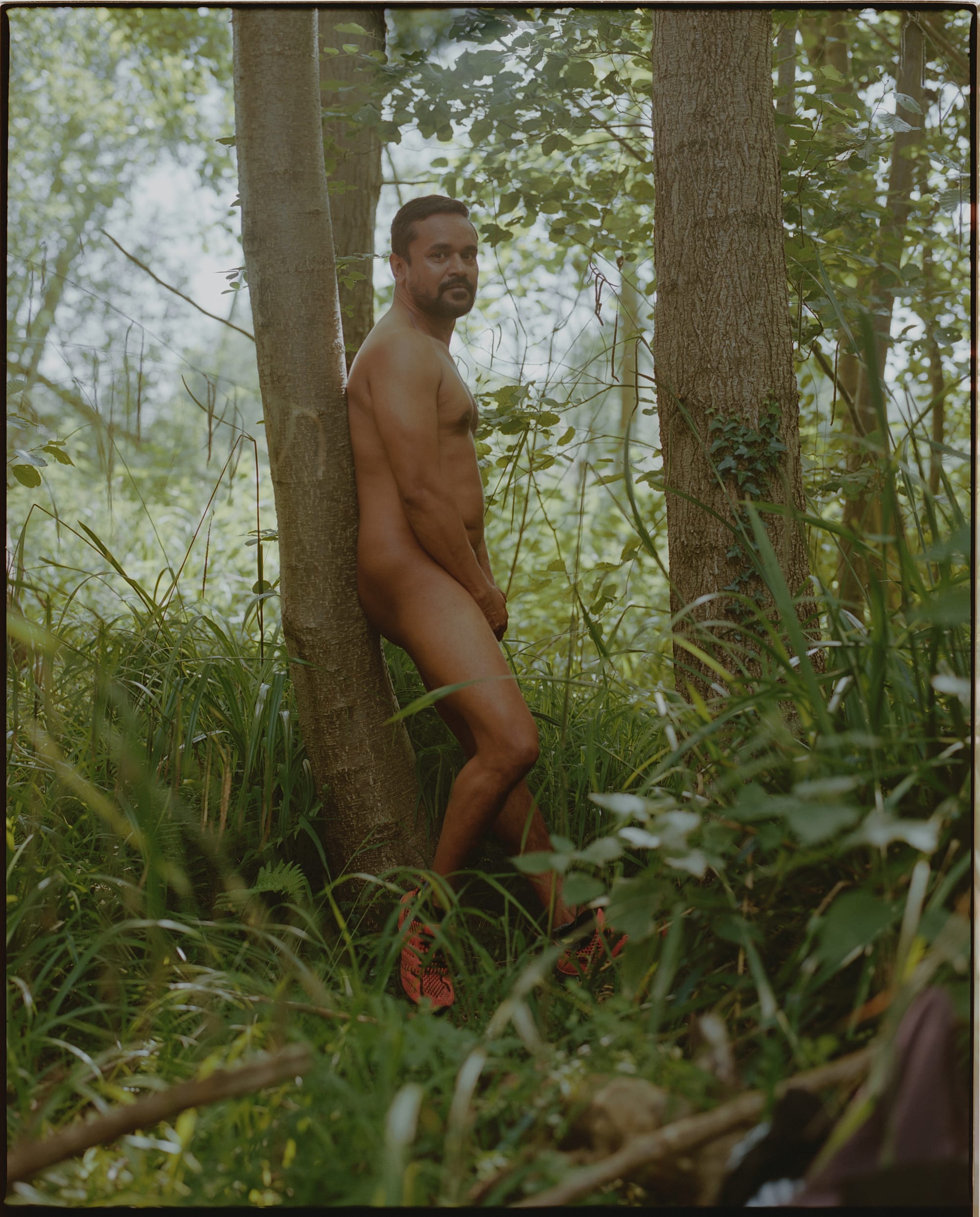
What drives you forward with regards to activism and advocacy?
Survival and the fierce belief that we all deserve to live freely, safely, and authentically. It keeps me going when I remember my friends, Xulhaz and Tonoy, two beautiful souls who were brutally murdered in 2016 in Bangladesh in their own home simply for being gay and choosing love. Their blood still stains the silence of a nation too afraid to grieve them. It drives me forward every time I read about another young person in our Bangladeshi LGBTQIA+ community who has taken their own life, not because they were weak, but because the world was too cruel. Every suicide is a scream the world refused to hear. I carry on when I hear about our lesbian sisters are being forced into marriages they didn’t choose, raped by their own husbands, imprisoned by tradition. I think of my community members claiming asylum, cutting off their roots to stay alive, starting over from scratch with nothing but hope and trauma in their hands. When I see my friends in Bangladesh living with HIV, forced to carry their diagnosis like a badge of shame, silenced by stigma and fear, I know I have more work to do. Silence kills. Stigma kills. But truth can heal. What keeps me going is memory. Grief. Rage. Love. Hope for a better world where homophobia doesn’t exist. I fight so that no one else has to lose what I lost. I fight so that queer joy can be celebrated, not punished. I fight so our people can find homes, dignity, and healing, not closets and cages.
What would you do if you were Prime Minister for the day?
If I were Prime Minister for a day, I would change the world – because real justice knows no borders. I would abolish all laws criminalising homosexuality across the globe, starting with the Commonwealth countries, many of which still uphold colonial-era anti-LGBTQIA+ laws that the UK originally imposed. I would push for a Global LGBTQIA+ Protection Charter, ensuring safety, legal rights, and asylum protections for queer individuals everywhere. I would dismantle discriminatory immigration systems, making it easier for queer people fleeing persecution to find sanctuary and dignity. And I would redistribute wealth equitably ensuring every human being has access to housing, healthcare, education, and safety, regardless of geography, gender, or sexuality. Because justice without equity is hollow. Liberation without dignity is incomplete. And no one should be left behind because of who they love or where they’re born.
How do you see your activism evolving over the next year?
At the moment, I’m focused on Manchester Pride 2025, where we will be representing the British Bangladeshi LGBTQIA+ community and we will organise an Art Camp the day before the pride day for our community members.
VIV
"I am blessed to be surrounded by the most inspiring young artists and activists in London"
VIV is a 24-year-old cultural organiser, performer, and community builder creating joyful, radical spaces for queer liberation in London. They are an active member of Act Up, and recently hosted the annual This Is My Culture Sexual Freedom Party on Hampstead Heath for the third year in a row, which is a free, open-air protest party that brings together queer people from all walks of life to celebrate, grieve, and dance an an act of resistance. For VIV, it's about embracing queer passion and rage, using these emotions to facilitate spaces of unapologetic expression.
They are also a co-founder of Moi Ko, a theatre and production collective that holds queer and politically conscious art at its core. Through culturally conscious playful programming, Moi Ko creates and hones genuine connections. In August, they’ll host their next event: Queer Prom at The Carpet Shop in Peckham, a rave-meets-roleplay night of dancing, games, and community celebration.
Whether via nightlife, performance, or protest, VIV’s creative and collective practice is grounded in the belief that queer community building is more than just an act of resistance.
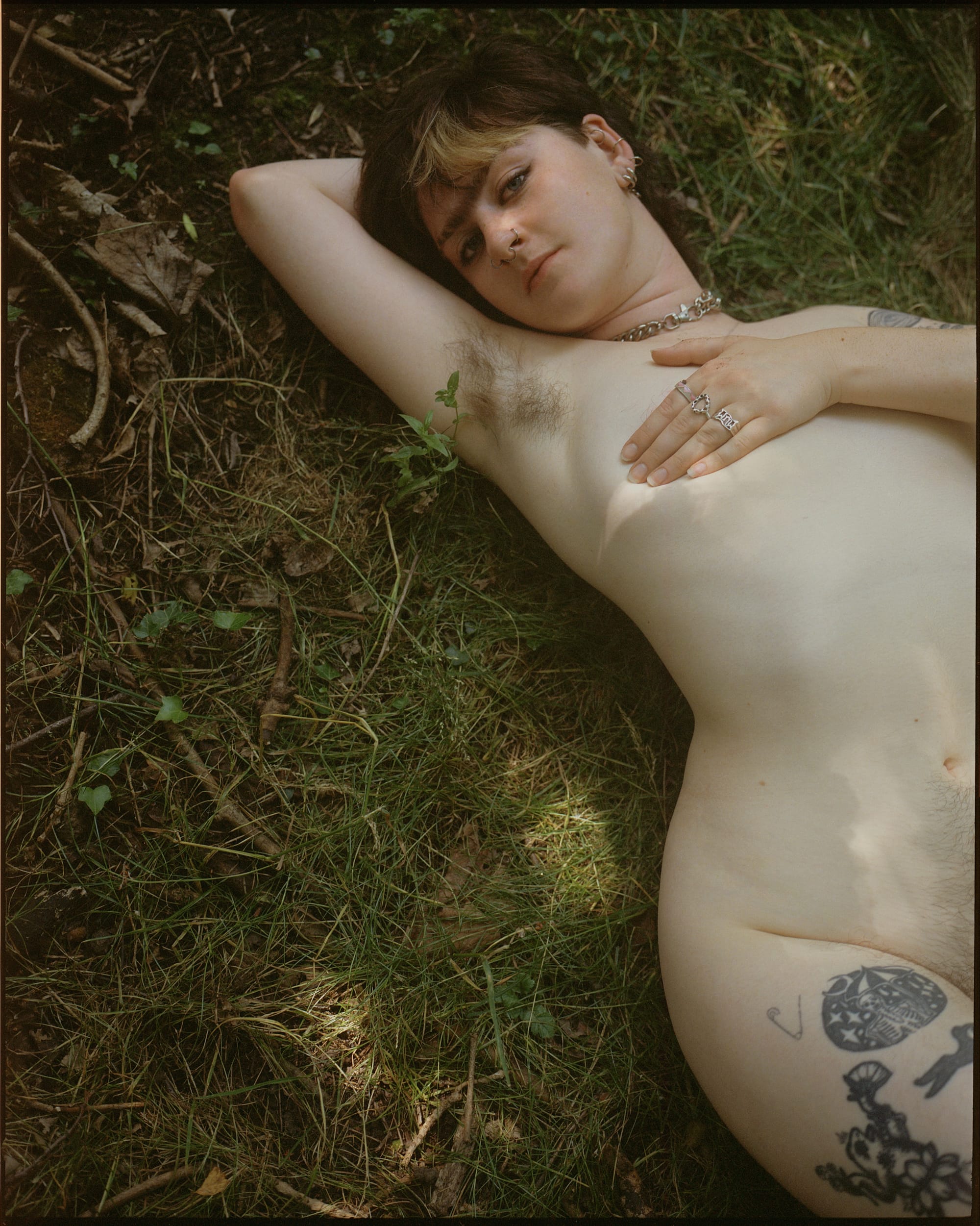
Any big activism or advocacy projects you’ve been working on at the moment?
I think activism isn’t always about the big projects, it’s about taking small opportunities and creating big change through them! Talking to a handful of people about a free Palestine, funding healthcare not warfare or trans rights can be a lot emotionally when you care so deeply, and you definitely have to choose the right moment to do this, but these small scale conversations can create just as much impact!
What pushes your activism forwards?
My chosen family. I am blessed to be surrounded by the most inspiring young artists and activists in London, who I get to rally and chant and march with, but also laugh at and make cups of tea for! Sometimes I have to pinch myself when I’m with them, because I really got so lucky. Also, I have to be honest, fear. Things are looking scary out there on the big wide world stage right now, and although it’s intimidating and easy to feel no control over it all, taking action, no matter how big or small, helps me feel like I have a grip on the direction of my own future; you have to remind yourself, ya know, I’m on this big world wide stage too.
What would you do if you were Prime Minister for the day?
The British Government is using tax payers money to fund illegal war crimes and the genocide of innocent Palestinian civilians. I would pull all of this corrupt funding and funnel it straight into education and healthcare #LoveNotWar! Also, I would free the Filton18, who have currently been held in prison without charge for 10 months for taking direct action against the genocide. Crazy isn’t it how much money there is for war, but not for our NHS, people with disabilities or working class families just about surviving through the cost of living crisis…
Finally, you got your kit off for this shoot. How does it feel to see yourself naked?
Lying in between the trees, feeling little bugs wander over me, the wind brushing my skin… it was beautiful! This is how we’re all meant to be living, soil between the toes, full bush out, surrounded by our beautiful Mother Earth! Not choosing between three identical t-shirts to wear to pay seven quid for a shit pint in some random metallic gentrified box.
DOUG FOOT
"There is always something to challenge regardless of the so-called system that we live under and with"
Doug Foot is a 64-year-old activist, therapist, gardener, and proud radical faerie whose activism began in the late 1970s. Born and raised in Sydney, he spent time as a teenager living in a radical faerie commune, which kickstarted his interest in activism and is something he’s still very much involved with today. At just 19, he was laying in front of bulldozers to protect rainforests in northern New South Wales, and with that, his life of activism began.
Amid the AIDS crisis in the 80s, Doug found both purpose and resistance in the LGBTQIA+ community. He became involved with ACT UP through a housemate who was a leading campaigner, and he continues to collaborate with the movement today, with lots of work lined up over the next few months. He’s passionate about inclusivity and believes that bringing people together, despite their differences, is essential to collective healing.
He’s also an active member of Critical Mass, a monthly bike ride which started in 1994 which aims to reclaim the streets of London for cyclists. His work blends joyful community, sustainable hedonism, and interpersonal connectivity, from drumming circles and retreats to queer cultural gatherings like This Is My Culture – Doug’s activism really knows no bounds.
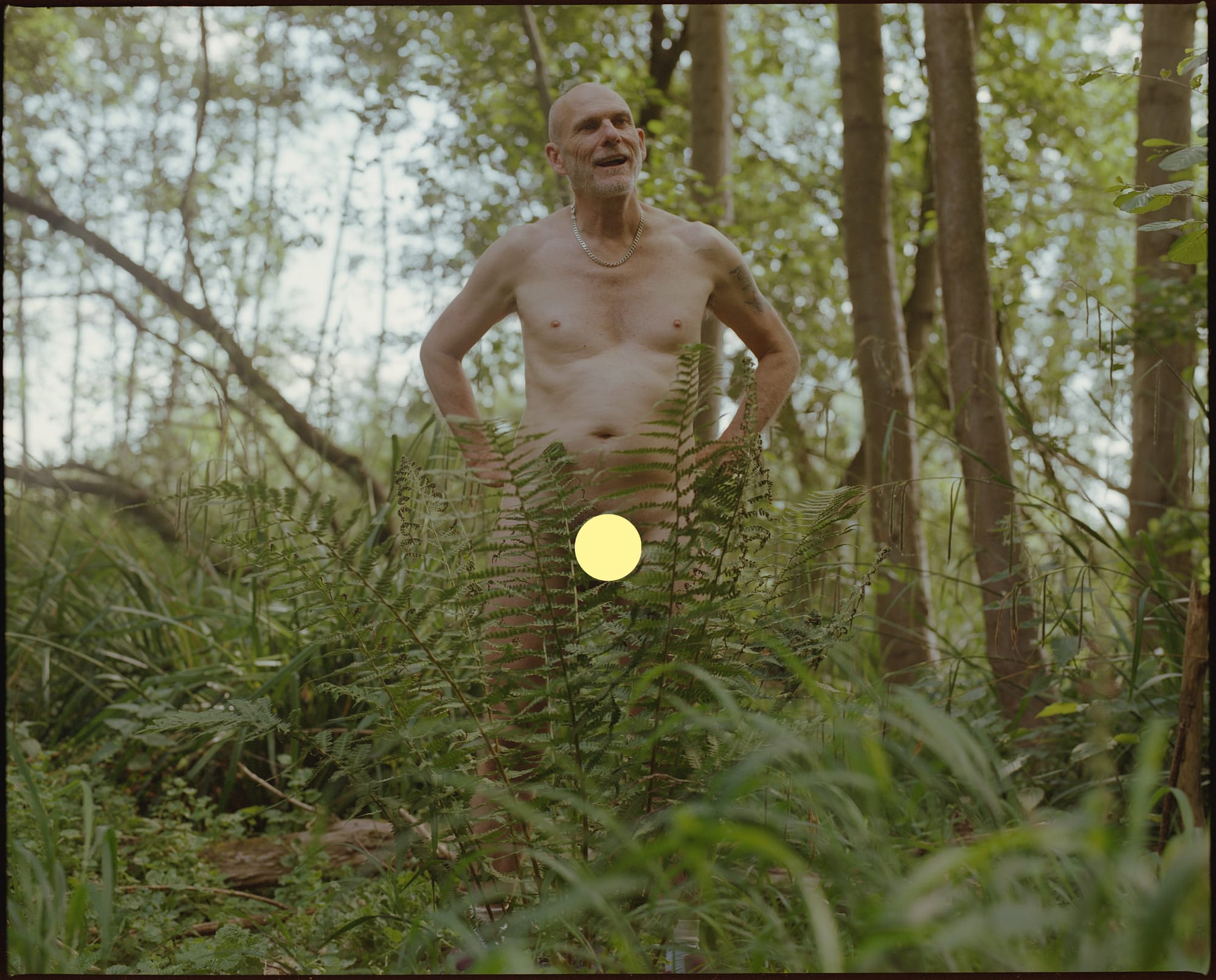
You started out as a radical faerie. Tell us more about what that is and involves?
When I was 19 years young, being a radical faerie was very much about being part of an emerging counterculture which at the time had been fermenting in countries including the US, the United Kingdom and elsewhere. It was a reaction to overconsumption of the earth’s finite resources, pollution and ecological degradation and the military industrial complex that was well and truly on the rise. Also part of the ‘Small is Beautiful' movement ( Small Is Beautiful: A Study of Economics As If People Mattered is a collection of essays published in 1973 by German-born British economist E. F. Schumacher). Also part of what some might say was a ‘romantic’ back-to-nature movement which values the hand crafted over the industrial. Living as part of a faerie commune during my late teenage years helped me to understand that even primarily urban people can live a more sustainable life. This means that we can learn to grow our own food, and explore our culture, which at the time involved celebrating and reinvigorating pagan rituals around, for example, the summer and winter solstice as well as experimenting with drag, especially as a social and political act of solidarity within queer community.
For me, being a radical faerie means living and advocating for the belief that queer people can fully embrace our natural roles as healers, shamans, ritual magicians and artists. We’re here to reconnect our human minds and hearts to the realms of our innate spirituality. So being a radical faerie is very much about exploring my evolving understanding of our individual and collective innate spirituality as queer people.
What drives you forward with regards to activism and advocacy?
There is always something to challenge regardless of the so-called system that we live under and with. For example, one of the challenges of our time is very much about not falling into the trap of divide and rule, a phenomenon that has been alive for thousands of years, from before and after the Roman Empire. This is a political construct and at the moment it is being lived out through seemingly endless culture wars, not to mention the also endless proxy wars that the so-called West continues to engage in.
Gender fluidity has been a long suppressed trait that has re-emerged in a world made safer thanks to the work of the pioneers of gay liberation. Third gender people have existed in all cultures of the world, and have been very much associated with creativity, healing and even magic. Indigenous Americans understood that a person who was born both female and male was also a bridge between people and spirit. In pre-Roman Europe it was the same. Trans priestesses and gay priests served in the pagan culture until the Christian armies annihilated them. We can be part of a one world movement where our diversity is a key strength in acknowledging our oneness rather than being continually distracted by our differences.
What would you do if you could rule the country for a day?
Immediately restore funding for foreign aid that has been suddenly switched to fund defence and the killing machine, and to restore the Overseas Aid budget to 2010 levels before the Tories and Liberal Democrats got into bed together to cut overseas aid and further greatly reduced by the current Labour government. Cutting overseas aid to fund warfare and not welfare and community development is catastrophically impacting on HIV prevention and other health and community service provision especially in Africa.
RYAN ZAMAN
“Nothing about us, without us”
Ryan Zaman is a model, editor, writer, and advocate focused on disability inclusion and representation. He first entered the advocacy space through his modelling career, using public visibility as a platform to raise awareness about disability. Through speaking candidly about his Cerebral Palsy, he has become a trusted voice within the disabled community.
Most recently, he founded Alloy Worldwide, a platform for intersectional and disability-centred advocacy and storytelling, utilising his diversity and inclusion experience to further educate brands and organisations. As such, he’s delivered keynote talks on disability and inclusion in corporate spaces and provides consultancy services, using his voice to lift up others.
He is also currently an editor at CircleZeroEight magazine, where, alongside his focus on automotive and motorsport, he loves to interview disabled athletes, Paralympians and talent, offering a rare and unique perspective as someone who finds a lot of commonality with different aspects of their lived experiences. His presence on set supports those featured in the magazine, acting as a bridge between talent and production to ensure comfort, safety, and authenticity, further pushing representation in the best possible direction.
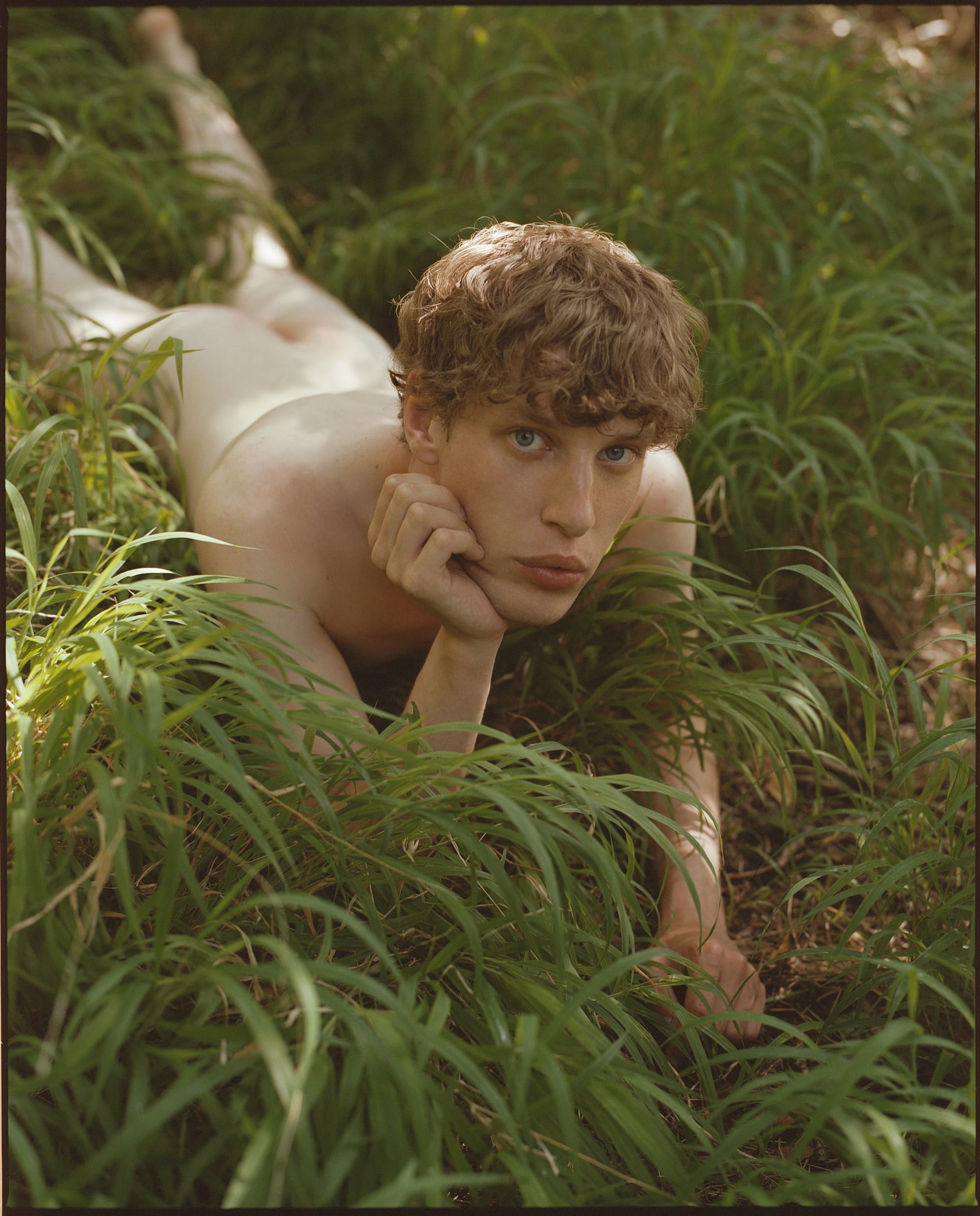
Representation is so important when it comes to minority groups. What are your thoughts on the representation of people with disabilities?
I think there's always work to do. In my view, when it comes to representation and inclusion, if you look at it in terms of protected characteristics, the disabled community tends to come at the bottom end of the list, which is a bit wild considering our community represents the largest minority group in the world – approximately 1 in 4 people in the UK are disabled. There’s a lack of awareness, which is due to a lack of representation in the real world, and a real fear of getting something wrong. Typically, there’s also little engagement in everyday life between non-disabled people, and people who choose to be open about their disabilities, if they are not already in the same immediate social, familial or professional circles.
How do you navigate those conversations about your disability?
People might have disabilities and it's totally their prerogative whether they want to disclose or talk about it. I am on a sliding scale, everyone is! Sometimes I'm in the mood to talk about it, and sometimes I’m not. It's one part of my identity. It doesn't define me. It may define how I move through the world, but it doesn't define me as a person. Lots of people in the disabled community feel that way, but I don’t speak for everyone, our community is not monolithic, as with any other community. There is definitely a long way to go, but I think the key is for non-disabled people to start to have those conversations with people that are happy to discuss, and not shy away from it. This is especially the case when it comes to the queer community. According to research conducted by The Trevor Project, 38% of young queer people identify as disabled, with 28% of queer adults stating they have a disability. This is significantly higher than the general public who identify as queer, at around 20%. Proportionately then, it seems like the non-disabled LGBTQIA+ community has the most work to do here to help disabled queer people feel seen, heard and included.
Hard to hear I’m sure, but taking away my bi-ness and the struggles that come with that in the queer community; thinking about just my disability, I would say, in my experience (generally speaking), I feel less welcomed in queer spaces as a disabled person compared to non-queer spaces. This will not be the case for everyone, but I feel it’s important I take this opportunity to highlight how I feel honestly - this could be something to do with me being a cis man with a disability, but really, who’s to say? It could also be partly to do with physical accessibility, as if we think about long-standing, historic queer venues, they are more-often-than-not in harder to reach, underground spots, literally and figuratively. However, this isn’t to say improvements can’t be made simply because “this is how it’s always been.” Even so, I don’t really have to justify why I feel this way if that is how I feel. Notwithstanding, of course I am a proud member of both the disabled and queer communities, and I’ve got great friends who also occupy the space between the two with me.
What change would you like to see happen over the next year?
A lot of my friends also work in the fashion industry so it's great to be able to go into rooms with like-minded people and peers to talk about these things. How can we use our hard-earned connections within the industry to spread awareness to people who might not be aware? It's one thing me taking photos and answering your questions, but it’s another for people's curiosity to be piqued enough that they feel a duty to learn and improve their own awareness of others’ experiences and challenges, because that's how change really happens.
How do we bring about that change?
People in positions of power not being scared to have the conversations. People being more open to differing perspectives and not being afraid of being wrong. If you think something is iffy or there could be blowback, consult people early on in the process. If something is specifically aimed at one particular community, speak to those people and see how it lands with them in a controlled setting, before you put something out in the world or implement an initiative. There's a really famous saying that springs to mind: “nothing about us, without us.”
PHIL SAMBA
"At school, we weren’t taught about HIV, consent, or even how to access sexual health services"
London-based activist Phil Samba is a researcher, and advocate for queer health. He is a leading voice in community-driven health promotion, particularly for marginalised groups often left behind in mainstream health conversations. He currently works at The Love Tank, a community interest company focused on improving queer health.
Phil’s work spans multiple projects. He is currently collaborating with Preventx to improve the Sexual Health London HIV and STI self-testing service, leading focus groups with marginalised users to gather feedback on testing experiences and clinical access. He also recently received a fellowship from Durham University, where he is launching a research project on the acceptability of injectable PrEP amongst Black queer men. Through community knowledge dinners, he is gathering relevant insights to shape proactive health interventions, pushing for policy that centers those most at risk.
In addition, Phil is rooted in London’s ballroom scene. In February, he organised a unique ball through The Love Tank called Under One Roof that integrated sexual health outreach with community celebration, offering M POX vaccines, self-testing kits, and a panel on health in the ballroom scene, with more events coming up in the not-too-distant future.
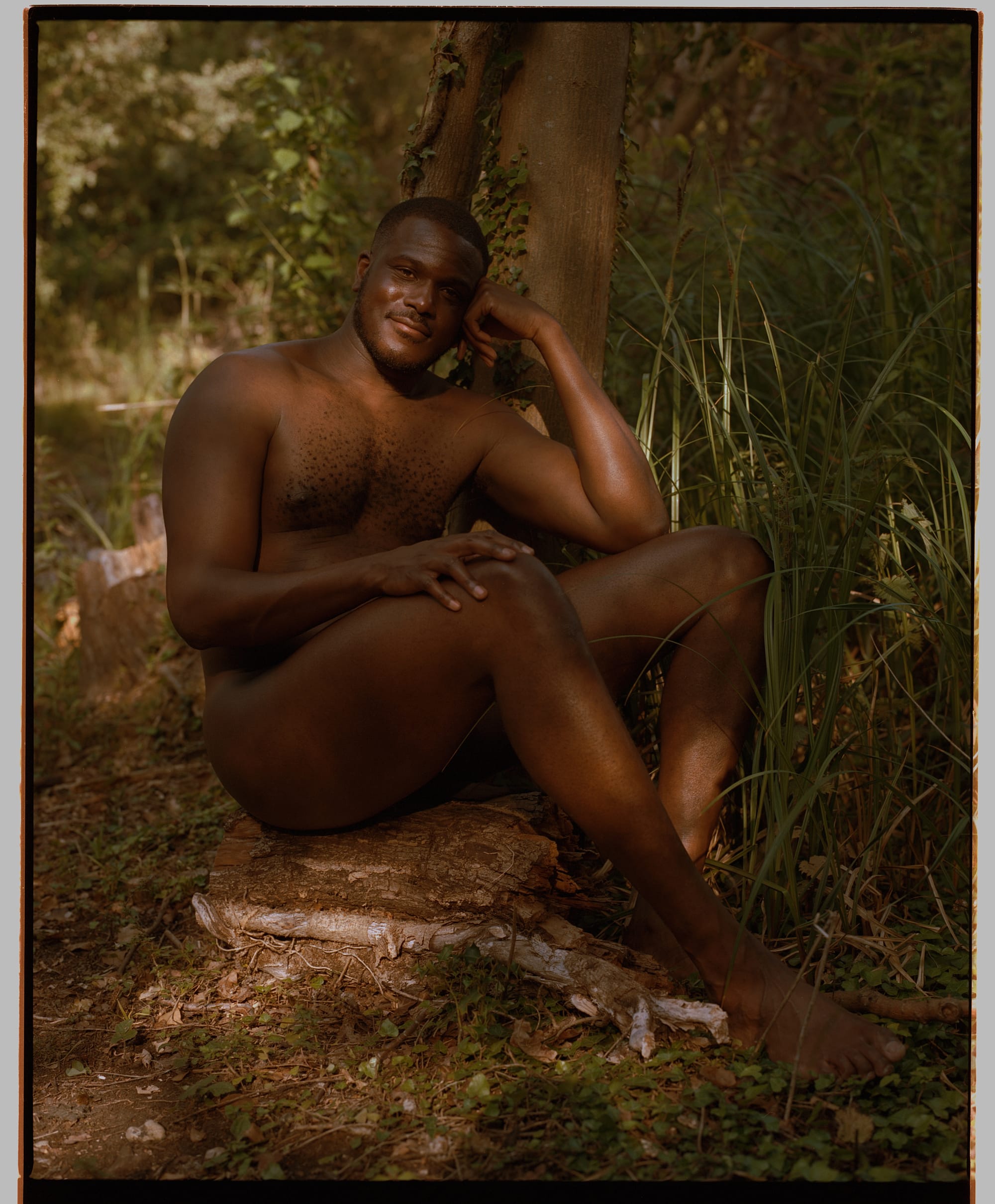
A lot of your work revolves around sexual health. Where did your interest in this come from?
I’ve never shared this publicly before, but one of my uncles died of HIV, and to this day, we don’t know how he contracted it, whether it was through sex or if he was even queer. That left a lasting impact. I remember getting tested for the first time in 2013 and realising how little I actually knew. We weren’t taught about HIV, consent, or even how to access sexual health services. Section 28 was still in place for most of my time at secondary school, so there was a real absence of queer education. I’ve always been quite open about sex, I’d tweet about it and talk about it publicly. I was already comfortable discussing sex, so it made sense to speak up about things like PrEP and sexual health.
What drives your advocacy forward?
One big factor is the lack of Black queer men in this field, especially those doing health promotion rather than working as clinicians. There are some of us, but not many, and even fewer around my age. That creates a real sense of responsibility for me, especially when it comes to supporting the community in meaningful, long-term ways. Although, I have been doing this work for a while, and I’ve thought about taking a break at some point. I know sexual health will always be a part of what I do. As long as we continue to see higher rates of STIs and HIV in our communities, I’ll stay involved. This work is too important, and too personal, to walk away from completely.
You stripped off for the shoot. How comfortable are you being naked?
I've been quite lucky because I have a really good relationship with my body. I think it's very normal in the gay community to have hang-ups around your body. I used to struggle a lot with my body as a teenager. I'm six foot five, and standing out felt uncomfortable, especially as a Black, closeted queer kid at an all-boys Catholic school in East London. I wanted to blend in, but my height made that hard. Over time, though, those experiences helped me become more accepting of my body. It’s been a journey, and quite different from what many people I know have gone through. I try not to compare myself to others. It's one of the most important things I've learned – you need to love your body as it is.
You’re ruling the country for a day. What do you do?
If I were PM for a day I would completely cease all arms to Israel, first and foremost. The fact that the government has said they would and is still providing weapons is beyond me. There are several economic problems we have with the impact of Brexit, the cost of living crisis and the housing crisis. I would tax the rich more and lower the taxes of working-class people, I don't understand why people who make millions have so many loopholes when it comes to taxes. I would make plans to build more affordable housing to deal with the rising rates of poverty and homelessness. I would do something about the insane energy bills, rent/mortgages and food prices, the price of a large bottle of ketchup is absolutely shocking! I'd make it so the NHS could never ever be privatised and invest in the NHS so it's not so underfunded and understaffed and my focus would be on structural racism in healthcare, improving healthcare outcomes for trans and non binary people and migrants, reducing waiting lists for ADHD and autism and making mental health services accessible for everyone who needs it. I'd defund the police, re-allocating public funding to go to other services that address the root causes of crime such as mental health crisis teams, drugs and alcohol support, domestic violence shelters, affordable housing, education and job training and youth services. In education, I would make inclusive sex education mandatory for all and I'd make comprehensive Black British history and practical life skills taught. I would want to put money back into creative arts. I would have a focus on climate change; reduce dependence on fossil fuels and aim to reduce air and water pollution.
MILO TURNLEY
"This community needs support but also deserves access to trans joy"
Milo Turnley is a passionate advocate for trans rights, working across media, activism, and community building. Alongside PR roles for TransMission PR and London Trans+ Pride, he is the founder of Transkaters, which creates safe skating environments for LGBTQIA+ people. The collective champions accessibility, including WCMX (wheelchair motocross), and is committed to fostering joy, safety, and reconnection to the body through movement.
“I feel like we're really building something very beautiful and a space where trans people can reconnect to their bodies in a genuinely safe space.” Milo explains. “We're consistently learning from each session how we can better support the community. Trans joy feels like a form of activism through Transkaters and that's a space that we take very seriously.”
Across his work, he’s driven by a deep commitment to equity, representation, and joy for trans people. Whether behind the scenes or on the ground, his activism and advocacy is rooted in visibility, community, and creating real, tangible change.
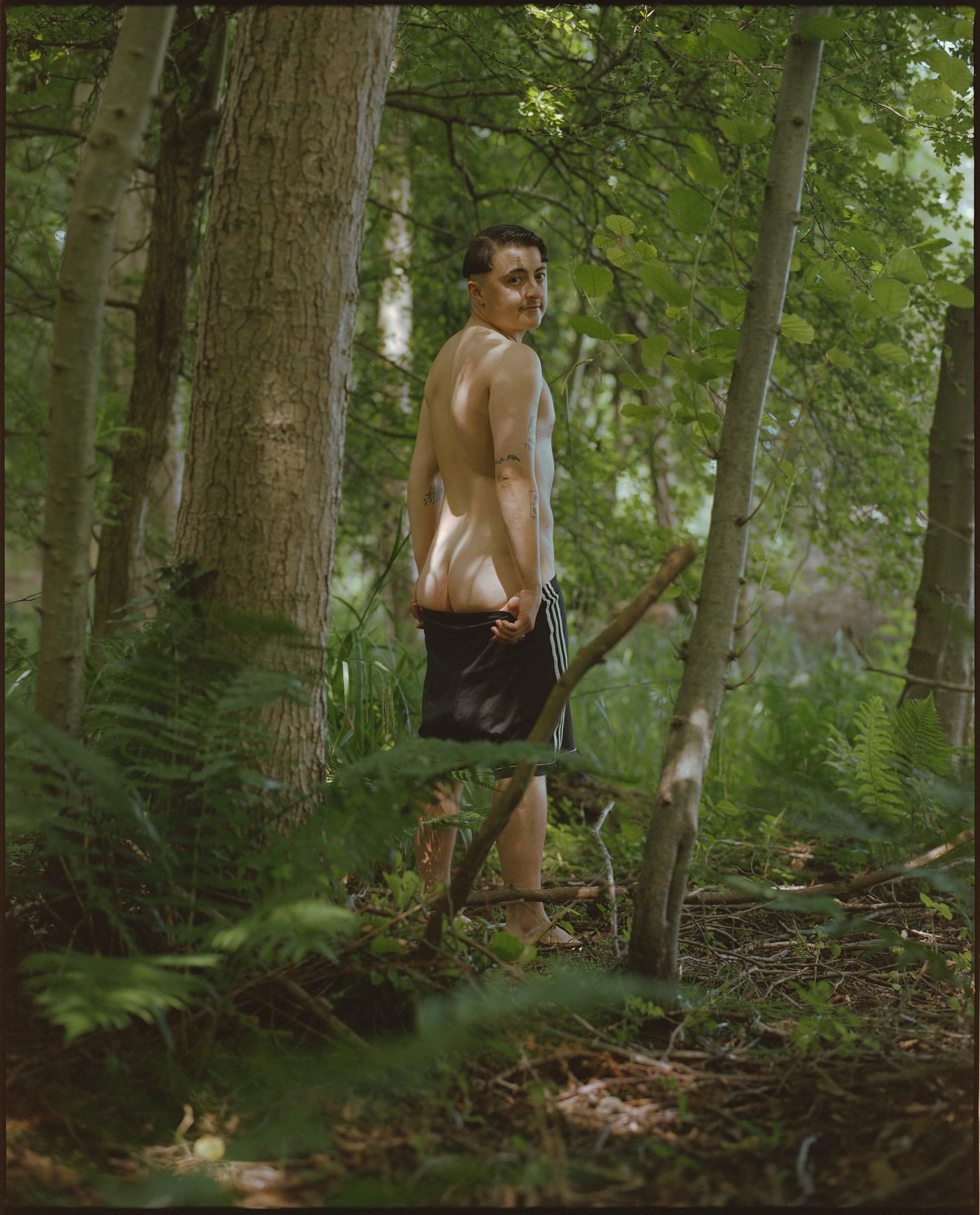
Where did the idea for Transkaters come from?
I started Transkaters in August 2023 because I’d stopped skateboarding and really missed it but I couldn’t find a consistent, genuinely comfortable space to return to. I put out a call on Instagram inviting trans people to meet me in Victoria Park, and to my surprise, around 15–20 people showed up. From that first session, it was clear how powerful it felt to move together as a group, like a little hive, where people felt protected and free to try new things without judgment. It’s grown from there into a proper collective, and now we run regular nights at BAYSIXTY6, a park I used to skate at as a kid. At its core, Transkaters is about building safety, trust, and the freedom to fail and try again, something hard to do unless you truly feel safe. Trans-specific spaces like this are vital, especially in today’s climate. They offer a rare sense of ease, where no one assumes your gender, you don’t have to mask, and you can just exist. That kind of relief opens the door to joy, emotional release, and unmasking for neurodiverse folks. It’s a space of real acceptance, and that’s what makes it so powerful.
What is it that drives you forwards with regards to your activism and advocacy?
It all comes back to community for me. Community very much saved me. I have lived in London for over a decade now and it took me a minute to find the community that makes me feel genuinely seen, safe and allows me to spread my wings. This community needs support but also deserves access to trans joy. See unbridled trans joy at Transkaters, especially with our trans youth, keeps me going because that's something that I didn't have. I didn't have any exposure to LGBTQIA+ knowledge or resources as a teenager and it took me into my early twenties to realise that I was queer and then I didn't come out as trans until I was 28, so I want to contribute to supporting trans people across all ages.
If you could be the PM for a day, what would you do?
I would end the UK's complicity in genocide. I'd immediately cease all arms sales to Israel. I'd demand an end to the genocide in Palestine and provide meaningful support for Sudan and the Congo. The way that Starmer is so spineless in the face of these atrocities is completely unforgivable. It’s also important to mention the UK's racist immigration policies that have been emboldened with the rise of Reform and the far right movements. every person deserves dignity, safety, the right to seek refuge. I'd also implement anti-racism training from a young age to dismantle white supremacy which requires such constant, intentional work. It's also important to mention male violence as well. I would fund huge programmes to dismantle toxic masculinity, misogyny, transphobia at their roots. I would make sure that trans healthcare was properly remodeled and that it’s something that we could receive at all times without any dehumanising hoops to jump through! Wes Streeting is getting booted straight out too! [Takes a deep breath] This is going to be a big job!
You got your kit off for this shoot. What is your relationship like with your body?
I've got a complicated relationship with my body. I still experience dysphoria, dissociation, moments where my body doesn't feel like mine – the latter not so much anymore, thankfully. There's something very beautifully vulnerable about being naked in this shoot that mirrors the vulnerability of being trans in public spaces and in skateboarding. I felt it was important for me to do this because I feel like if one trans person sees this story, it could mean a lot to them. Maybe someone who's got a similar body and scars to me will see this and it makes them feel slightly less alone in their skin. If so, it’s worth it.
Lastly, how do you want to see your work evolve over the next year?
With Transkaters, we’re holding our second retreat this August on the Isle of Wight—three days of skating, camping, wellness, and community at a beautiful venue called Canopy. We also run monthly LGBTQIA+ skate nights at BAYSIXTY6, plus accessible picnics across London. We’ll be marching at Trans Pride on July 26th too. Beyond events, I think it's crucial right now for cis allies to speak up, challenge misinformation, and show up, especially as things politically shift right. We must protect each other, care for our mental health, and remember that looking after ourselves is a vital part of activism, because you can’t show up for your community if you haven’t shown up for yourself first.
COURTNEY FRANCIS
"I act as eyes and ears of the club, safeguarding patrons so they can safely enjoy the party"
Courtney Francis is a registered nurse specialising in care for adults who are autistic and individuals with learning disabilities, but he’s also deeply connected to nightlife culture as a longtime club enthusiast. Through his own experiences, Courtney noticed how many vulnerable people in nightlife settings often lacked empathetic support. Recognising the importance of acceptance and safety in these spaces, he was inspired to use his clinical knowledge alongside personal insight to improve people’s nightlife experiences.
Courtney’s advocacy began with volunteering in harm reduction, driven by both professional commitment and personal loss. He saw firsthand the impact of vulnerability and substance-related harm in these environments, motivating him to help create safer, more supportive spaces.
Currently, he works as a medic for Safe Only, a queer, trans, and POC-led welfare organisation dedicated to providing compassionate care in clubs and venues. His role includes offering friendly, non-judgmental support to patrons, collaborating with security teams, and advising venues on improving safety and inclusivity. Through his work, Courtney strives to make nightlife a welcoming environment where people can enjoy themselves without fear or stigma.
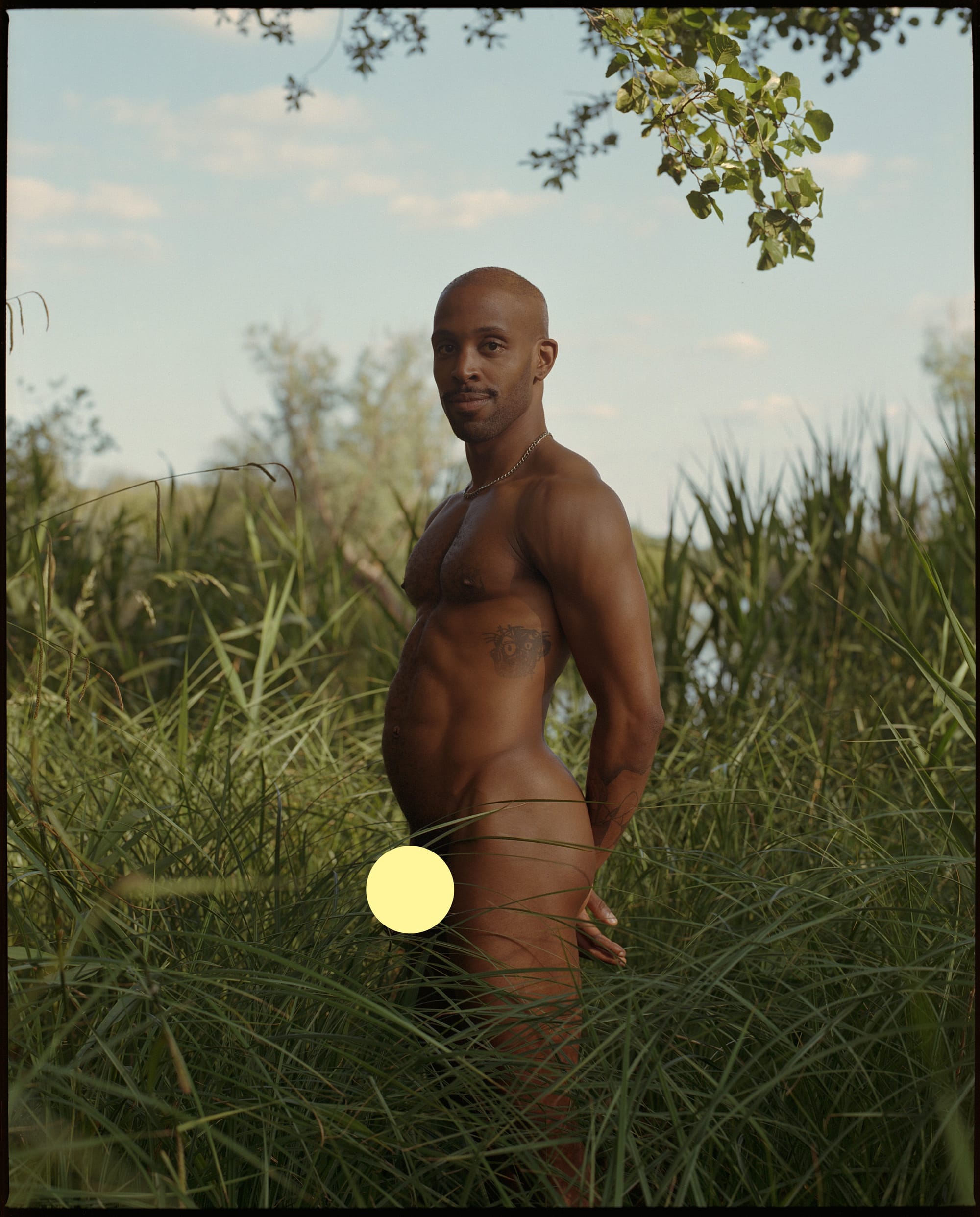
What does it mean to be a welfare angel?
As a welfare member of staff who also has nursing experience. I often end up working extremely close to the paramedic on site. I act as eyes and ears of the club safeguarding patrons so they can safely enjoy the party. Between patrons and the formal staff, I am on hand for anyone in the club, such as if someone's just not feeling it and I can be there psychologically as a supporting ear. If someone's going through a hard time with substances I can even refer to specialist harm reduction talking services (Antidote / London Friend). I've even had autistic individuals talk to me knowing I’m an autism nurse and share their need for somewhere to calm down by regulating their breathing and heart rate, whether it's temperature-wise or the sensory overstimulating environment is too much. I’m often able to facilitate the needs of many different intersectional groups of individuals within the club setting.
What inspired you to get into this world of work?
I lost a close friend, and I didn’t even think it was possible to lose a member of your chosen family in your mid-20s. I wish I personally was more informed. I think it's such a taboo topic, death and mental health, that we often shy away from, however I’ve found talking candidly about substance misuse or any potent safeguarding risk and or vulnerabilities reduces risk of such events occurring. I would often be the person that would want to bring up these topics sensitively or talk through what I was feeling inside with my chosen family. I found myself slowly creating a space where people would speak to me about how they were feeling about these things also. We then found a network of individuals and that slowly grew incrementally. So it was kind of like a support group of likeminded advocates and individuals who were passionate to see and be part of a change in queer nightlife. Now we're trained and we have strong evidence-based knowledge to inform our interventions and we are removing the stigma around harm reduction.
Why is nightlife such a huge part of queer culture?
Nightlife has always been for me somewhere where I could go to truly express myself. In my nursing, my Monday to Friday 9-5, I didn't feel I could really be my eccentric queer self. However, when I'm out in nightlife I can unmask, I can absolutely be my true self, and feel comfortable.
You’re a world leader. How are you using your power?
I would have people of lived experience curating and making policies. For example governments would not be able to pass a policy impacting the trans community unless you have trans individuals spearheading it. If you make a paper, if you make a law or you try to amend something, you really do need to not just speak to those individuals, rather really have those individuals draw up the plan and share their lived experience and expertise in formulating what policies need to look like. A lot of my nursing clinical experience is working with people with disabilities and/or autism, I couldn't imagine doing something that impacts that group of people without having spoken to them and truly having an understanding of what they actually require.
You go-go dance. Has that had an impact on your relationship with your body?
I get a lot of compliments about my physique. However, I grew up very underweight and I had a lot of body dysmorphia around my appearance. I recall experiencing anxiety over long eyelashes or having dark skin. Through music and dance therapy aka dancing, I began to unpicked at that. For me, go-go dancing isn't about my sexual appeal, it's about being present in my physical body, feeling comfortable, and enjoying the movements and shapes my body makes. It’s a full sensory experience listening to the sound and feeling the bass and being present in the musical experience with everyone in the crowd. So it's more of a celebration of my journey and feeling comfortable within myself.
How do you hope to see things change over the next 12 months?
A lot of my friends have ‘come out’ recently telling me they’re autistic. It is amazing how many people in the electronic music scene, especially towards the front of the DJ deck, are autistic and/or neurodivergent. However, we very rarely accommodate these individuals' needs, whether it's needing to be at a close distance near the speaker, a certain amount of proximity to dance, to cool down, or to not get bumped into. So, I would like club promoters and venues to speak to these groups and aim to be more neurodiverse-friendly, given that community is such a big part of the music scene and history.
JENG AU
"I want people to realise that there's power in us doing small things every day"
Jeng Au is a community organiser and advocate creating expansive, affirming spaces for trans people. In 2022, they co-founded Camp Trans, an annual grassroots festival which is now in its 4th year. Attracting over 300 guests this year, the festival offers music, physical activity, workshops, art performances and wellness experiences. “The name Camp Trans actually comes from a festival in the US, which was a protest festival from the 90s. They first started to push against Michigan Womyn's Music Festival’s transphobic policy that wouldn’t allow trans women to attend. That camp doesn't run anymore, but we've had past organizers and attendees come to our Camp Trans in the UK and that's been really special.” they explain. For Jeng, the power of the festival lies in its ability to foster joy and connection, creating a space where trans people can imagine new worlds together.
Aside from Camp Trans, they also run Trans Sauna with a few friends, which is a twice-monthly sauna takeover in London catering exclusively to trans individuals. Rooted in Finnish sauna culture, it’s a sober, body-positive space bringing together up to 120 people for rest and relaxation in a safe and comfortable environment. They hope to push Trans Sauna to locations outside of London over the next year.
Whether organising festivals or leading sauna nights, Jeng’s work is grounded in the belief that trans people deserve not just safety, but celebration. Their projects reflect a powerful ethos: trans spaces are absolutely vital.
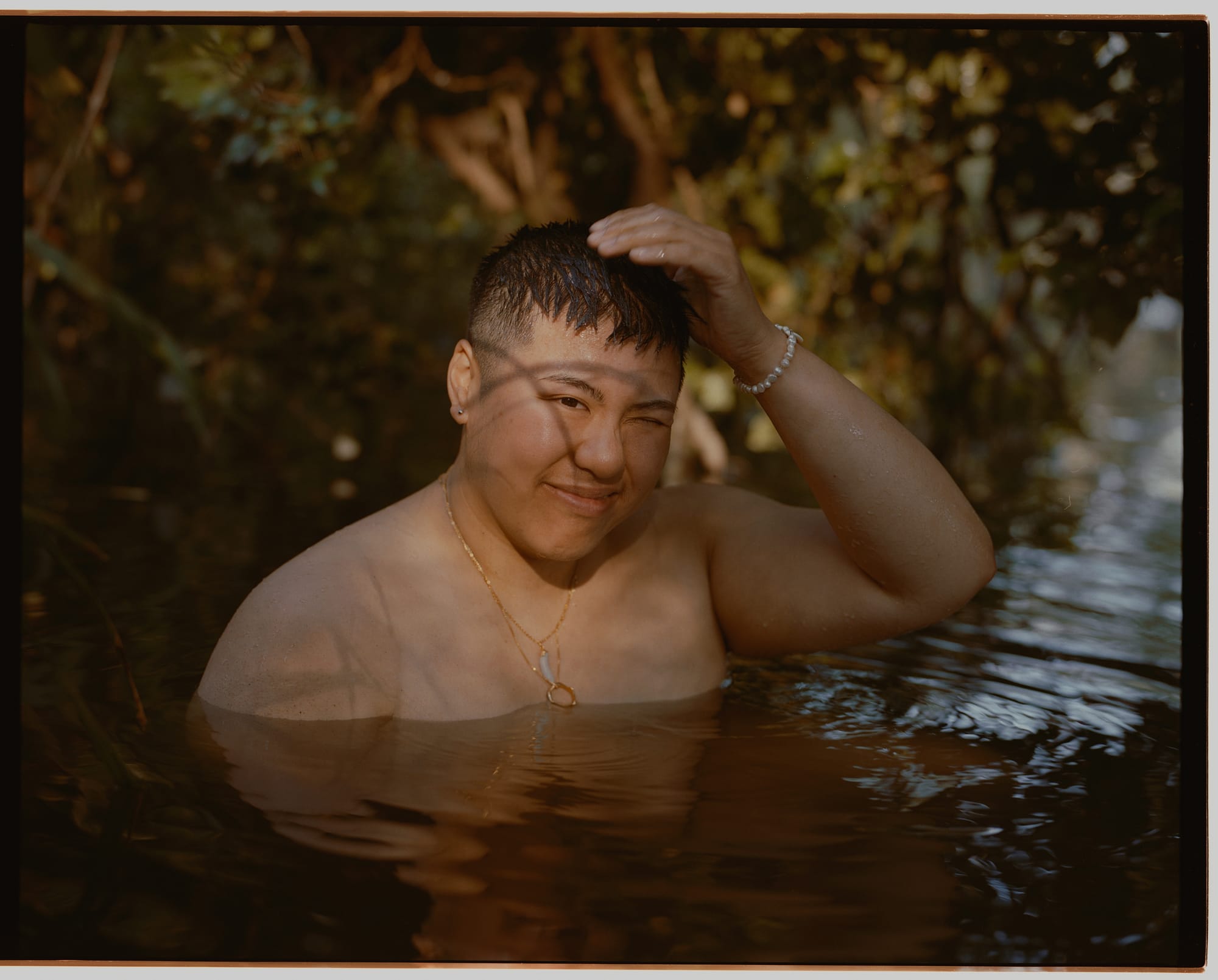
What drives you to create these spaces?
When I first started, I was like ‘Oh, I really want these spaces for myself! I wish this existed… let me make it exist!’. When we see something that's missing, we have the power to make that for ourselves. As I work on more of these projects, the more people tell me how important it is to them, the more I feel like I'm really making something that's beyond me. That's really motivating.
It feels like there’s a real sense of community at the heart of Camp Trans. What does that community look like?
Essentially it’s just hanging out with all your trans mates, and all their trans mates, and all their trans mates. But beyond that it’s a big mixture for sure. There’s rollercoasters, passion, ups and downs, people having highs and lows. Trans people, like everyone else, have such a broad range of emotions and interests, so we can't have spaces that box us in or suppress that. We are not trying to control anyone's way of being and pretend everything must be joyful or beautiful. Our programming is basically trying to offer something for everyone. Whether that’s attending a workshop to learn a new skill, or as simple as being able to lay by the water and read a book, being able to cathartically cry around the campfire, or have time to make new connections, or wrestle a stranger in slime, or have an audience to scream to at karaoke. There's something for everyone!
You stripped off for this shoot. How does it feel to be nude?
In the past, I would have been very shy about it but I think the sauna has really changed me honestly. Regularly going to the sauna and being undressed , I'm a lot less closed off. I quit swimming when I was growing up because of hating my body more as it changed, but more recently I’m realising I love my body and I think that came with time and work. Sauna helped, too!
You asked to be photographed in a body of water. Tell me about your affinity to water.
My family come from Hong Kong, so my name is Chinese and in my name, there's a character for water because when I was born, there was no water in my chart so my parents put it in my name to complete the elements. Being in water is something that I need to do regularly to look after myself.
What are you hoping to achieve with your advocacy?
I want the projects I’m working on to spark change. I want people to realise that there's power in us doing small things every day, whether that's just starting up a conversation with a stranger at the sauna.
Finally, what’s next?
We have our next camp this summer from September 18th to the 21st. I can't share too much but it's in South Wales. You can find out more on our Instagram @camptrans or on our website https://www.camptrans.uk/. You can also keep up with Trans Sauna events on our Instagram @trans.sauna.
